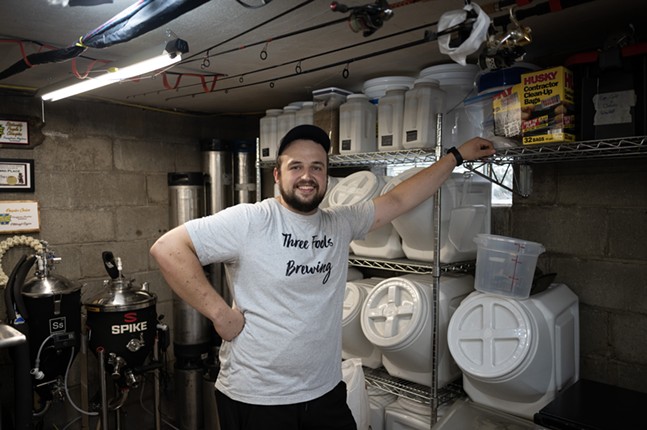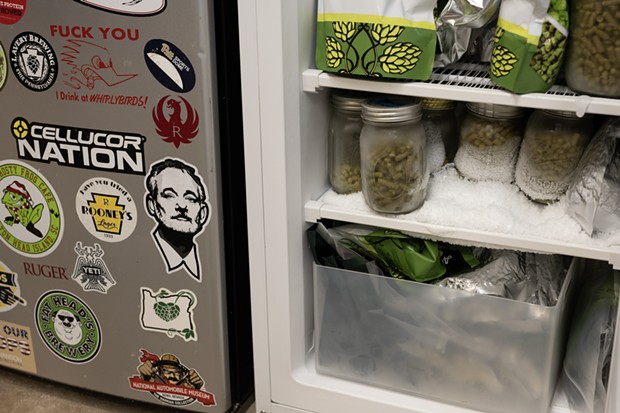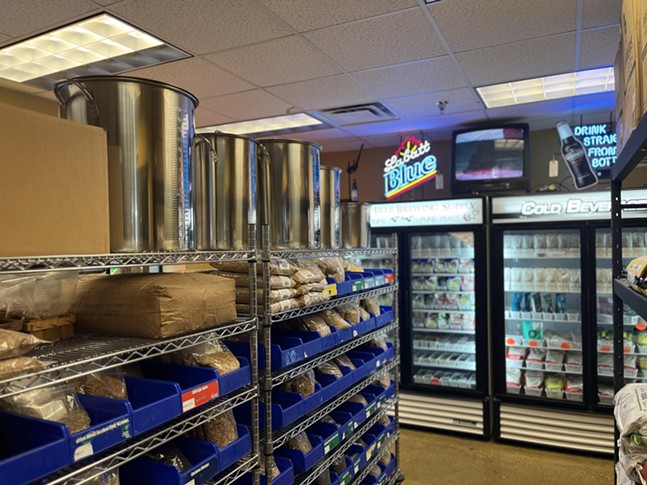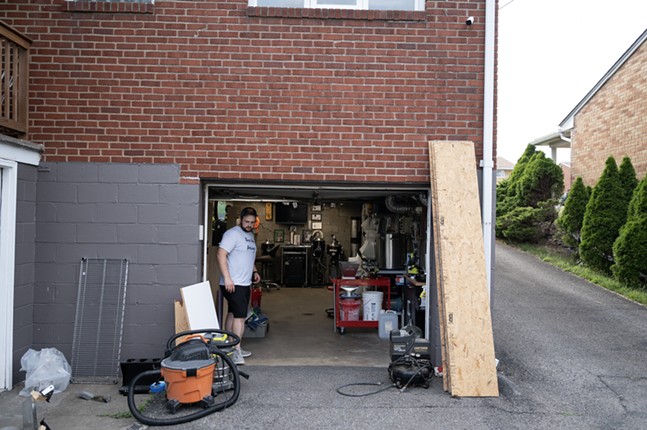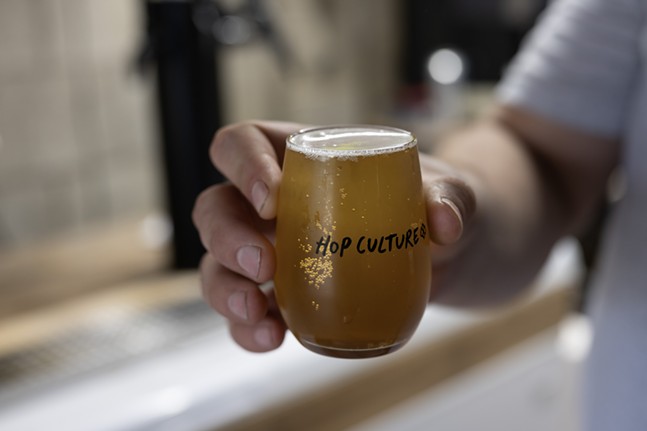The next time you enjoy a craft beer, thank Jimmy Carter. His signing of H.R. 1377 in 1978 legalized homebrewing.
At that time, there were around 100 breweries nationwide making mostly low-ABV lagers. Following H.R. 1377, however, pioneering homebrewers and adventurous importers began to challenge that status quo. Those early sips of something different changed the landscape — even with industry contractions, the U.S. now boasts almost 10,000 breweries nationwide, including more than 40 in Allegheny County, as well as numerous homebrew supply stores, local brewing clubs, and homebrew competitions.
Brewing can be as simple or complicated as you make it, but nearly every hobbyist starts out as I did: with a big steel pot, a PVC bucket, and a prepackaged ingredients kit.
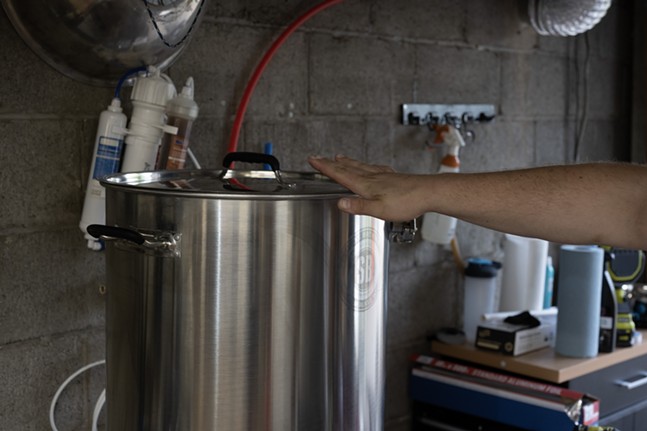
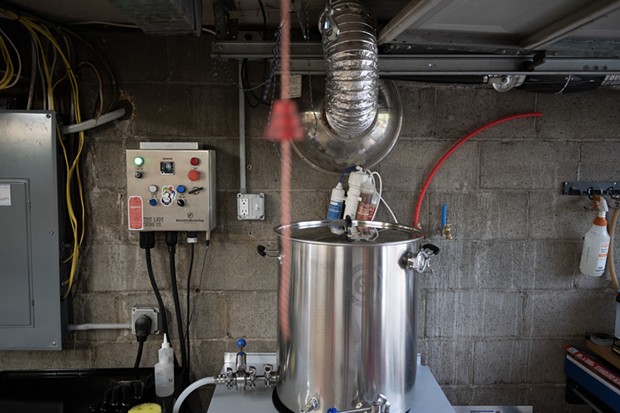
That was how Collin Azinger got into homebrewing. Intrigued by the growing variety in the beer distributor where he worked during college, Azinger went to the store and picked up his starter kit.
“It was the Brewer’s Best Mexican cerveza kit,” Azinger tells Pittsburgh City Paper. “If I remember correctly, it was terrible. It was drinkable, but it just had that definitely oxidized, plastic-bucket beer taste. But I was just hooked.”
“Shoutout to my parents,” Azinger laughs. “I burned, like, an entire propane tank brewing this beer on the side burner grill.”
The rabbit hole of homebrewing goes as deep as you want — Azinger’s home setup now approaches what some nanobreweries use. But whether you’re making kits in a big pot or brewing like a professional, Azinger and others say Pittsburgh’s brewing ecosystem is as vibrant, supportive, and multifaceted as it’s ever been, with numerous opportunities for collaboration, competition, or talking shop over a pint.
From grist to glass
If you’re unfamiliar, making beer usually consists of turning malted grain — i.e., grain that has been partially sprouted and then dried or roasted, which allows it to produce sugar — into a shelf-stable fermented beverage by converting that sugar into alcohol. Different grains produce different tastes, mouthfeels, and colors; hops add natural bitterness and preservatives; yeast produces the actual alcohol and contributes its own flavors. Some beers are rounded out with additions of fruit and spices or produced with yeast and bacteria strains that give off sourness and funk.
In 2024, brewers of all stripes have access to a wider range of all of the above than ever before. A dedicated industry of food scientists continues to breed new hop and yeast varietals, and brewers respond by developing new styles of beer or resurrecting long-lost recipes. Without Jimmy Carter and the flood of brewers, drinkers wouldn’t have access to beers such as the lichtenhainer, gose, or tmavé pivo.
Jon Benedict, owner of South Hills Brewing Supply & Country Wines, has seen this evolution in real time. The shop turns 30 this September.
“When we first opened, there just wasn't really all that much for home brewers,” Benedict tells City Paper. “You would get your whatchamacallit from the hardware store; you would get your thingamabob from a flea market.” Benedict says that, when the shop first opened, there were only four strains of dry yeast available — now, he says SHBS carries 70 liquid yeast strains and dozens of dry varieties.
“The products are so much better, and homebrewers are producing better beer,” Benedict says, “and that's the same thing with winemaking.” He and store manager Stephen Bourdeau also say they’ve seen growing interest in mead and steady, if seasonal, interest in making hard cider.
There are also a variety of salts and chemical buffers brewers can use to improve the quality of their water or simulate the water used in classics like Pilsner Urquell. (I recently began experimenting with several to offset Pittsburgh water’s high pH and heavy chlorination). SHBS also carries everything from starter kits to more advanced hardware and testing equipment.
Clayton Homa, president of Three Rivers Underground Brewers homebrewing club (or TRUB, the term for the particulate matter that settles out of fermenting beer), says advances in homebrewing technology have made it far easier for hobbyists to level up from the typical pot-and-bucket setup.
“Just like everyone else, I started with a stovetop, big pot, extract. I was really kind of intimidated by the big, three-vessel systems,” Homa tells CP. He says the rise of all-in-one electric brewing systems, such as the Grainfather, has taken lots of the guesswork out of making beer. “It really worked out nice for this generation of brewers that the barrier to entry for all-grain has definitely lowered.”
Benedict says he’s seen similar shifts. “Back in the old days of brewing, it was all extract with a little bit of specialty grains … at that point, somebody that brewed from all grain, it's like, wow, you’re some advanced, crazy Martian person,” he jokes. “Now, it's just the opposite.”
While the hobby has adapted to new products and technology, it has also fluctuated with the craft beer market, with both homebrewing and craft brewing feeding into which beers predominate in local taprooms and homebrew competitions.
What’s on tap
Despite COVID — which forced SHBS to close their original Green Tree location and made meeting in person a challenge — and changes in the industry, including the closure of several local craft beer destinations, everyone I spoke to for this story said interest in the hobby is steady. What’s changed is what people are making.
Benedict says he’s seen a resurgence of interest in traditional hop varieties and lagering (which requires fermenting at colder temperatures). This is apparent at many local breweries, as well — when I meet Azinger at Dancing Gnome Beer in Sharpsburg, he points out the many lagers on tap compared to Dancing Gnome’s hazy-heavy early days.
“Don't get me wrong; I still love good hazy IPA,” he says. But Azinger says he appreciates the crispness of a good lager — and the challenges and patience of making one.
Brewing clubs, including TRUB, the Three Rivers Alliance of Serious Homebrewers (TRASH), and Westmoreland Area Zymology Enthusiasts (WAZE), are key to navigating these challenges. Azinger says each offers different resources, though membership among all three overlaps considerably. Each club’s Facebook group is bustling with a combination of events, competitions, troubleshooting, and equipment swaps. Several members have since turned their hobby into a profession.
Homa says that, beyond advice and camaraderie, he’s gotten lots of equipment through TRUB’s Facebook group. In January, the club met for a supply swap that saw members pass around unused fermentation buckets, miscellaneous gear, and unfinished bags of grain.
“Don't spend a fortune right away,” Homa advises new homebrewers. “If you want to give it a whirl, it probably won't even cost you a penny between every member there that still has a plastic bucket fermenter and top that they're trying to get rid of.”
One of TRUB’s central focuses is planning Brewing for a Cause, an annual beer fest that donates proceeds to charitable causes — the 16th annual event, taking place Oct. 19 at Velum Fermentation on the South Side, will donate to Paws Across Pittsburgh animal rescue. TRASH and WAZE, meanwhile, run regular competitions and events, including TRASH’s annual competition at which winners receive SHBS gift certificates.
Another recent TRASH event saw homebrewers gather at Fermata Brewing in Ambridge to receive five gallons of wort (unfermented beer) to turn into whatever kind of beer they wanted. Azinger says he appreciates the club’s lack of gatekeeping and collaborative spirit. “TRASH is pretty involved with the Barrel & Flow stuff, so I know they're doing a lot of cool collabs with some of those businesses and organizations,” he says. The club hosted a collaborative brew session last weekend specifically for the upcoming Barrel & Flow festival.
This is the real beauty of Jimmy Carter’s bill all these decades later: it fostered a vibrant community, one grounded in mutually beneficial exchanges, that has taken deep root in Greater Pittsburgh over 30-plus years. Azinger says he’s grown from the feedback and encouragement such groups provide — usually over beers, of course. Most gather monthly to give members space to plan for events and catch up (TRASH’s next regular meeting is Sat., July 20 at CoStar Brewing in Etna).
“It's just fun. That brings it back to the collaboration, the people end of it,” Azinger says. He encourages those new to the hobby not to be intimidated. “Dive in headfirst. Just go for it … If you have questions, ask. There's so many good people in Pittsburgh, in TRASH, TRUB, and otherwise, that [can] point you in a direction, and it can become an addiction. I'll say that the hobby is definitely infectious.”
TRUB president Homa concurs. His advice to new brewers? “Come to meetings. I mean, at worst you'll talk to some nerds while having a couple beers.”

